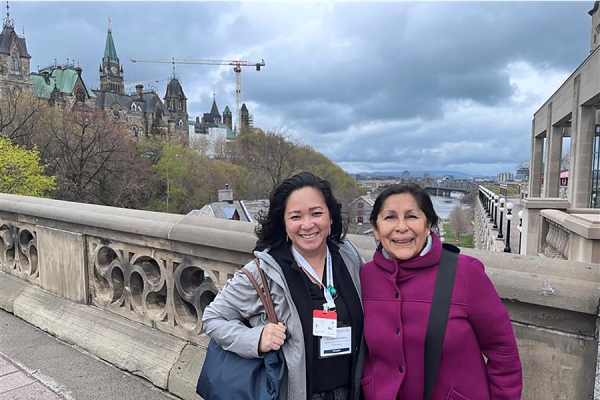 UWindsor professor Catherine Febria met with water engineer and Senator Rosa Galvez in Ottawa during Science Meets Parliament, May 1 and 2.
UWindsor professor Catherine Febria met with water engineer and Senator Rosa Galvez in Ottawa during Science Meets Parliament, May 1 and 2.
UWindsor professor Catherine Febria, director of the Healthy Headwaters Lab and Canada Research Chair in Freshwater Restoration Ecology, joined Canada Research Chairs, Banting post-doctoral fellows, Indigenous scholars, and other emerging researchers to attend the Science Meets Parliament event in Ottawa on May 1 and 2, co-sponsored by Canada’s chief science advisor, Mona Nemer.
The Science Meets Parliament program seeks to strengthen Canada’s scientific and political communities, with virtual and in-person elements designed to make scientists more familiar with policy making. The Canadian Science Policy Centre is a non-profit, non-partisan organization that serves as an inclusive hub for connectivity, convening, and capacity-building.
As a delegate — the first Canada Research Chair from the University of Windsor to participate in the program — Dr. Febria trained for several weeks through virtual sessions to learn about decision-making across the federal government and considerations for science and policy.
Given her involvement with the Intergovernmental Science-Policy Platform on Biodiversity and Ecosystem Services (IPBES) and locally-grounded research with decision-makers and communities including at the Ojibway National Urban Park, Febria expects this program will help to bridge science with policy making here.
Febria had the opportunity to meet with local MPs Brian Masse (Windsor West) and Irek Kuczmierczyk (Windsor-Tecumseh), along with Canada’s National Focal Point for IPBES, the International biodiversity science-policy platform, and new science-policy peers who share her interest in applying knowledges to engage and change policy, funding, and decision-making at all scales.
“Given the multiple challenges facing society today — climate change, biodiversity loss, pollution, and more — it is necessary to understand how scientific research findings can be mobilized into actions as soon as possible,” she says.
“We have no time to waste. Engaging in decision-making is an important responsibility of publicly funded researchers, especially in my field where legislation and policy at all levels will have significant impacts on our environment, health, and well-being.”
Over the two-day experience, Febria met with key funding agencies and research partners at Parks Canada, Environment and Climate Change Canada, and Canadian representatives involved with the UN science-policy platform IPBES.
She lists as highlights her individual meetings with water engineer and Senator Rosa Galvez, whom Febria shadowed, Windsor MPs Masse and Kuczmierczyk, and a private tour of the House of Commons lobby.
